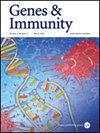Validating genetic variants in innate immunity linked to infectious events in acute myeloid leukemia post-induction chemotherapy
IF 4.5
3区 医学
Q1 GENETICS & HEREDITY
引用次数: 0
Abstract
Infectious events, such as sepsis and invasive fungal disease (IFD), pose significant risks in patients with acute myeloid leukemia (AML). Previous studies, including our own, have suggested a potential role of single nucleotide polymorphisms (SNPs) within the innate immune system in influencing individual infection susceptibility. However, many of these associations lack validation in independent cohorts. This study sought to validate the impact of 11 candidate SNPs across 6 genes (TLR2, TLR4, Dectin-1, DC-SIGN, PTX3, L-Ficolin) in an independent cohort of patients. Two cohorts with newly diagnosed AML patients receiving intensive induction chemotherapy were analyzed: a stratification cohort comprising 186 patients and a validation cohort consisting of 138 patients. Multiple SNPs in each cohort were found to be associated to infectious complications, notably the DC-SIGN SNP rs4804800 demonstrated a significant association with sepsis in both cohorts. SNPs within the PTX3 and Dectin-1 genes were linked to IFD development in one cohort each. This study represents the first validation study of candidate genes associated with infectious events in AML patients after intensive induction chemotherapy. Identifying genetic predispositions to infections could significantly impact the management of antimicrobial prophylaxis and treatment in AML patients.验证与急性髓性白血病诱导化疗后感染事件有关的先天性免疫基因变异。
败血症和侵袭性真菌病(IFD)等感染事件对急性髓性白血病(AML)患者构成重大风险。包括我们自己在内的以往研究表明,先天性免疫系统中的单核苷酸多态性(SNPs)在影响个体感染易感性方面具有潜在作用。然而,其中许多关联缺乏独立队列的验证。本研究试图在一个独立的患者队列中验证 6 个基因(TLR2、TLR4、Dectin-1、DC-SIGN、PTX3、L-Ficolin)中 11 个候选 SNPs 的影响。对接受强化诱导化疗的新诊断急性髓细胞白血病患者的两个队列进行了分析:一个是由 186 名患者组成的分层队列,另一个是由 138 名患者组成的验证队列。发现每个队列中的多个 SNP 与感染并发症有关,尤其是 DC-SIGN SNP rs4804800 与两个队列中的败血症均有显著关联。在一个队列中,PTX3 和 Dectin-1 基因中的 SNP 与 IFD 的发生有关。这项研究是首次验证与强化诱导化疗后急性髓细胞白血病患者感染事件相关的候选基因。确定感染的遗传倾向可能会对 AML 患者的抗菌预防和治疗管理产生重大影响。
本文章由计算机程序翻译,如有差异,请以英文原文为准。
求助全文
约1分钟内获得全文
求助全文
来源期刊

Genes and immunity
医学-免疫学
CiteScore
8.90
自引率
4.00%
发文量
28
审稿时长
6-12 weeks
期刊介绍:
Genes & Immunity emphasizes studies investigating how genetic, genomic and functional variations affect immune cells and the immune system, and associated processes in the regulation of health and disease. It further highlights articles on the transcriptional and posttranslational control of gene products involved in signaling pathways regulating immune cells, and protective and destructive immune responses.
 求助内容:
求助内容: 应助结果提醒方式:
应助结果提醒方式:


